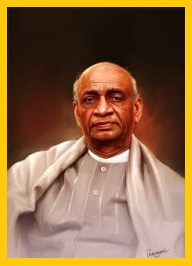Sardar Vallabhai Patel

Vallabhbhai Jhaverbhai Patel was born on October 31, 1875, at Nadiad, a place in present day Gujarat, India was an Indian barrister and statesman who was one of the top leaders of the Indian National Congress during the Indian freedom movement. Patel served as deputy prime minister, minister of home affairs, minister of information, and minister of states from 1947 to 1950. Patel was born to parents of a self-sufficient landowning family of the Leva Patidar caste in the state of Gujarat. Reared in an atmosphere of traditional Hinduism, he attended primary school at Karamasad and high school at Petlad but was mainly self-taught.
At the age of 22, Patel matriculated and passed the district pleader’s examination, which enabled him to practice law. He set up an independent office of district pleader in Godhra in the year 1900, and moved to Borsad after two year in search of better prospects. As a lawyer, Patel distinguished himself by presenting an incontrovertible case in an accurate and clearcut manner and challenged police witnesses and British judges. In 1908 Patel’s wife, who gave birth to his son and daughter, died, and Patel remained as a widower thereafter. For advancement of his career in the legal profession, Patel traveled to London in August 1910 to study at the Middle Temple. There he studied meticulously and passed the final examinations with high honors. In February 1913 Vallabhai returned to India and he settled in Ahmadabad and became a leading barrister in criminal law at the Ahmadabad bar. He was noted for his superior mannerisms, western style outfits and his championship in bridge at Ahmadabad’s fashionable Gujarat Club.
In 1917 Patel was influenced by Mohandas K. Gandhi and he adhered to Gandhiji’s policy of nonviolence. Having resolved to follow and support Gandhi, Patel changed his style and appearance. Patel started following a more traditional Indian lifestyle dressed in the white cloth of the Indian farmer. From 1917 to 1924 Patel served as the first Indian municipal commissioner of Ahmadabad and was its elected municipal president from 1924 to 1928. Patel first made his presence felt in 1918, when he planned mass campaigns of farmers and landowners of Kheda, Gujarat, against the decision of the Bombay government to collect the full annual revenue taxes even after crop failures caused by heavy rains. Vallabhai Patel successfully led the landowners of Bardoli in their resistance against increased taxes in the year 1928. His competent leadership of the Bardoli campaign earned him the title sardar which means “Leader” and henceforth he was acknowledged as a nationalist leader throughout India. He was considered realistic, crucial, and even merciless, and the British recognized him as a dangerous opponent.
In the crucial debate over the objectives of the Indian National Congress during the years 1928 to 1931, Patel believed that the goal of the Indian National Congress should be dominance status within the British Commonwealth - not independence. In contrast to Jawaharlal Nehru, who condoned violence in the struggle for independence, Patel ruled out armed revolution, not on moral but on practical grounds. Patel held that armed revolution would be fruitless and would incite severe repression. Patel, like Gandhi, saw advantages in the future participation of a free India in a British Commonwealth, provided that India was admitted as an equal member. He underlined the need to promote Indian self-reliance and self-confidence, but, unlike Gandhi, he did not regard Hindu-Muslim unity as a prerequisite for independence. Patel disagreed with Jawaharlal Nehru on the need to bring about economic and social changes by coercion. A conservative rooted in traditional Hindu values, Patel belittled the usefulness of adapting socialist ideas to the Indian social and economic structure. He believed in free enterprise and thus gained the trust of conservative elements and collected the funds that sustained the activities of the Indian National Congress.
Sardar Patel was in the race for presidency of the Indian National Congress during 1945-1946, but Gandhi intervened for the election of Nehru. As president of the Congress, Nehru was invited by the British viceroy to form an interim government. Under Nehru’s interim government in 1946, Patel held the posts of minister of home affairs and minister of information and broadcasting. After India’s independence on August 15, 1947, Patel additionally served as deputy prime minister, home minister, and minister of states for the next three years until his death in 1950. Often called the “Iron Man of India,” Patel is credited, for the incorporation of more than 560 princely states into the Indian Union during the country’s transition from a colony to independence in 1947. After his death Vallabhai Patel was honored with the Bharat Ratna, the country’s highest civilian award, in 1991. Every year, 31st October, the birthday of Patel, would be celebrated as National Unity Day.